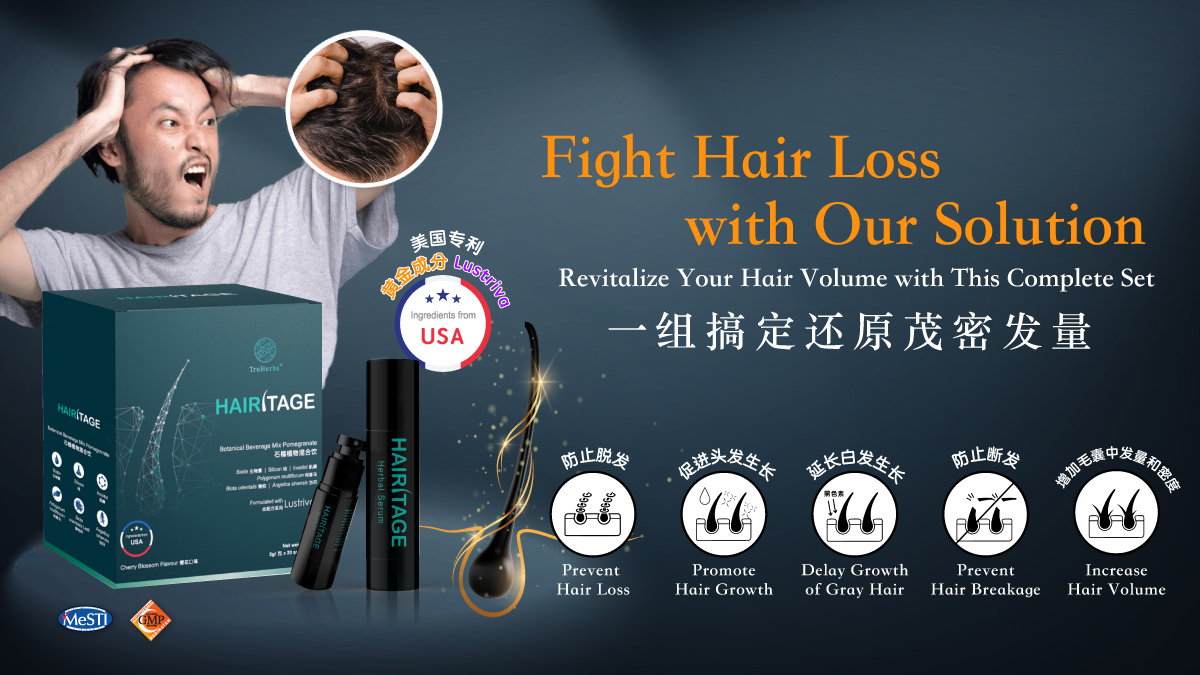Fine Hair: A Sign of Hair Loss? Can You Restore Thick Hair?

Have you noticed your once thick and voluminous hair gradually becoming finer and weaker?
You may start to wonder, could this be an early sign of hair loss? Many people assume that having fine hair is a minor issue, but it could be an early warning of deteriorating scalp health. In fact, hair texture and thickness are not only aesthetic concerns; they are closely related to your overall health.
Hair texture can reflect internal bodily changes—from hormonal fluctuations to nutritional deficiencies and prolonged stress. If we ignore these signals, the issue of fine hair could worsen, leading to eventual hair loss. This change not only impacts your appearance and confidence but may also hint at underlying health problems.
In this article, we will explore the various causes behind fine hair, whether it indicates impending hair loss, and how scientific hair care methods can help restore your hair’s strength and vitality. Fine hair doesn't have to be an irreversible fate; with proper care and adjustments, you can bring back the thick, healthy hair you once had.
Causes of Fine Hair
At some point, many people notice that their hair has become finer, losing its original thickness and texture. This change can be alarming, especially if you suspect it might be linked to hair loss. There are numerous reasons for fine hair, ranging from external factors to internal health conditions. Understanding these causes can help you take the right steps to prevent further hair thinning and protect your scalp’s health.
1. Genetic Factors
Hair thickness, texture, color, and density are heavily influenced by genetics. If your family has a history of fine hair or hair loss, especially from androgenetic alopecia (AGA), there’s a higher likelihood that you may experience similar issues. Fine hair is often an early indicator of hereditary hair thinning or baldness.
2. Hormonal Changes
Both men and women can experience hormonal fluctuations that affect hair thickness. For women, pregnancy, menopause, or using birth control pills can cause hormonal changes that lead to finer hair. In men, increased levels of dihydrotestosterone (DHT) can shrink hair follicles, resulting in finer hair and eventual hair loss.
3. Poor Dietary Habits
Healthy hair requires a balanced intake of nutrients. If you lack essential vitamins and minerals, such as iron, zinc, protein, and B vitamins, your hair’s growth and texture will be negatively impacted. It may become brittle, dry, and fine. Prolonged nutrient deficiencies can cause hair follicles to lose their strength, hindering their ability to produce healthy strands.
4. Stress and Emotional Fluctuations
In today’s fast-paced world, stress is a common factor. Prolonged exposure to stress can lead to an overproduction of cortisol, which disrupts the healthy functioning of hair follicles. High-stress levels can also push hair follicles into the resting phase, causing hair to thin and, in some cases, fall out.
5. Chemical Treatments and Heat Styling
Frequent use of hair dyes, perms, and heat styling tools (like curling irons and straighteners) can cause irreversible damage to your hair. These treatments can strip the hair of its protective keratin layer, leaving it fragile, weaker, and prone to breakage. Over time, this damage leads to thinning hair.
6. Natural Aging
As we age, our body’s metabolism slows down, and the growth cycle of hair follicles also decelerates. Hair thinning caused by aging is a natural process, but with proper care, this process can be slowed down, keeping your hair healthier for longer.
Is Fine Hair a Sign of Hair Loss?
Whether fine hair is a sign of hair loss depends on various factors. Although not all fine hair indicates impending hair loss, it is often an early warning sign. Here are a few potential indicators that fine hair could be a precursor to hair thinning:
1. Androgenetic Alopecia (AGA)
Androgenetic alopecia, or male/female pattern baldness, is the most common type of hair loss. It typically starts with hair that becomes progressively finer, as hair follicles shrink and eventually stop producing healthy strands. In men, hair thinning often begins at the temples and crown, while women experience overall hair thinning without balding.
2. Nutrient Deficiency-Induced Hair Loss
If fine hair is accompanied by increased hair shedding, it could indicate a deficiency in essential nutrients. In such cases, hair loss is often accompanied by other health problems like dry skin, fatigue, and more. Fortunately, this type of hair loss can usually be reversed by improving dietary habits.
3. Stress-Induced Hair Loss (Telogen Effluvium)
Chronic stress, surgery, illness, or major life changes can push hair follicles into the resting phase, temporarily halting hair growth. This type of hair loss, known as telogen effluvium, usually appears a few months after the stressful event and can be preceded by hair becoming finer.
4. Traction Alopecia
Frequently pulling hair into tight hairstyles, such as ponytails, braids, or buns, can put unnecessary stress on the scalp, damaging hair follicles. Over time, this can lead to thinning hair and, in severe cases, permanent hair loss.
How to Improve the Condition of Fine Hair
Fine hair isn’t necessarily irreversible. By making a few adjustments to your lifestyle and hair care routine, you can improve the condition of your hair and even restore some of its lost volume and thickness. Here are a few effective strategies:
1. Improve Your Diet
Hair health is closely related to your nutrition. Aim to consume foods rich in iron, protein, zinc, B vitamins, and vitamin D, such as eggs, fish, lean meats, green leafy vegetables, and nuts. If necessary, consider taking supplements designed to support hair health under a doctor’s guidance.
2. Manage Stress Levels
High levels of stress can negatively affect your hair’s health, so learning to manage stress is critical. Engage in relaxation techniques like yoga, meditation, walking, or other forms of physical activity to help regulate emotions and reduce the impact of stress on your hair. Adequate sleep is also essential for your body’s recovery and hair growth.
3. Choose Gentle Hair Care Products
Opt for sulfate-free, silicone-free shampoos and conditioners made with natural plant-based ingredients to reduce scalp irritation and repair damaged hair. Regular use of hair masks or deep conditioning treatments can also provide your hair with extra nourishment, preventing it from becoming too dry.
4. Regular Scalp Massage
Scalp health is directly linked to hair health. Regular scalp massages help stimulate blood circulation, providing hair follicles with more oxygen and nutrients, which can encourage hair growth. Using essential oils like rosemary or ginger during your massages can further enhance results.
5. Avoid Overstyling and Chemical Treatments
Heat styling tools like blow dryers, curling irons, and straighteners can cause significant damage to hair. Try to limit their use, or apply heat protectant sprays before styling to minimize heat damage. If you need to dye or perm your hair, choose gentle, low-chemical products and ensure sufficient time between treatments to allow your hair to recover.
How to Restore Thick Hair
Although fully restoring thick hair may be difficult, especially if fine hair is due to genetic or age-related factors, scientific internal and external treatments can significantly improve hair texture, making it appear healthier and fuller.
1. Use Hair Thickening Products with Collagen and Biotin
Many hair-thickening shampoos and conditioners contain collagen and biotin, ingredients known for enhancing hair strength and elasticity. When using these products, let the conditioner sit on your hair for a few minutes to allow for maximum absorption of nutrients. Long-term use can result in noticeably thicker hair.

2. TruHerbs Hairitage Dual Hair Regrowth Treatment: Combat Hair Loss and Boost Growth
Product Overview: TruHerbs Hairitage introduces a dual hair regrowth treatment set, including TruHerbs Hairitage Ginseng Fo-Ti Hair Growth Serum and TruHerbs Hairitage Herbal Hair Regrowth Drink. This product is designed to tackle hair loss and promote new hair growth through a dual approach, activating the scalp and hair follicles from within and externally to rejuvenate healthy, thick hair.
-
TruHerbs Hairitage Ginseng Fo-Ti Hair Growth Serum: A topical treatment containing nine natural herbal extracts like ginseng, Fo-Ti, and ginger root, it effectively regulates scalp oil balance, activates hair roots, and improves blood circulation. It strengthens hair strands, reduces hair loss and dandruff, and promotes thicker, healthier hair.
-
TruHerbs Hairitage Herbal Hair Regrowth Drink: This internal supplement uses a unique combination of Western and Eastern formulas, incorporating Lustriva (a patented ingredient from the U.S.), high-concentration biotin, silicon, and inositol. It enhances follicle activity, promotes hair growth, delays hair graying, and prevents hair loss. This herbal drink also improves hair texture, making it shinier and smoother.
-
Dual Benefits:
- Internal and External Care: By taking the herbal drink, you support internal bodily functions, promoting hair growth; simultaneously, using the ginseng serum externally helps improve the scalp environment, reducing hair loss.
- Follicle Activation: The dual action effectively activates follicle vitality, increasing hair density and strength while preventing hair graying and breakage.
- Comprehensive Hair Loss Prevention: This combination not only prevents and slows down hair loss but also promotes rapid regrowth, making your hair look fuller and healthier.
3. Scalp Treatment Therapy
Low-level laser therapy (LLLT) is becoming increasingly popular for hair care. It uses low-energy lasers to promote blood flow to the scalp, stimulating hair follicles. Regular use of this therapy can help improve hair quality and prevent further thinning.
Preventing Hair Thinning
Taking preventive measures is essential to maintaining your hair’s thickness and preventing future hair thinning or loss.
1. Maintain a Balanced Diet
A diet rich in proteins, iron, zinc, and other essential nutrients is crucial for preventing hair thinning. Regular blood tests can help ensure your body is in good health. If you detect any deficiencies, take the necessary supplements to restore nutrient levels.
2. Avoid Tight Hairstyles
Tight hairstyles like ponytails, braids, or buns can place unnecessary tension on hair follicles, causing traction alopecia. Opt for looser styles to minimize pulling and avoid long-term damage.
3. Regular Scalp Cleansing
In addition to regular shampooing, a monthly deep scalp cleanse is recommended to remove excess oil and build-up, ensuring follicles remain healthy and clear.
4. Sun Protection
Just like your skin, your hair is also vulnerable to sun damage. Long-term exposure to ultraviolet (UV) rays can dry out your hair and make it brittle. When spending time outdoors, wear a hat or use hair-specific UV protection sprays to prevent damage.
5. Maintain Healthy Lifestyle Habits
Avoiding late nights, smoking, and excessive alcohol consumption is vital to promoting healthy blood circulation to your scalp. Regular exercise can also improve overall blood flow, delivering nutrients to your hair.
5 Common Questions
Is Fine Hair a Sign of Hair Loss?
Fine hair doesn't necessarily mean you’re losing hair, but it can indicate deteriorating scalp health. If fine hair is accompanied by increased hair shedding, you should be more vigilant and take corrective action.
What Are Some Ways to Improve Fine Hair?
You can improve fine hair by maintaining a balanced diet, reducing stress, using suitable hair care products, regularly massaging your scalp, and avoiding physical hair damage.
How Can I Restore My Thick Hair?
Restoring thick hair can be achieved by using hair-thickening products, consuming adequate protein and collagen, and trying scalp treatments like laser therapy to improve hair density.
How Can I Prevent Hair from Thinning?
Preventive measures include maintaining a nutritious diet, avoiding tight hairstyles, regularly cleansing your scalp, and protecting your hair from sun exposure.
What Are Some Common Hair Care Products?
Common hair care products include hair-thickening shampoos, conditioners, hair masks, scalp exfoliators, heat protectant sprays, and oils infused with plant extracts and vitamins.
Conclusion
Fine hair may be an early sign of hair loss, but with the right care, a nutritious diet, and lifestyle adjustments, you can improve your hair’s condition and prevent further damage. A holistic approach, such as using TruHerbs Hairitage Dual Hair Regrowth Treatment, can rejuvenate scalp health, strengthen follicles, and help restore thick, healthy hair.

 Bahasa melayu
Bahasa melayu 中文
中文





















